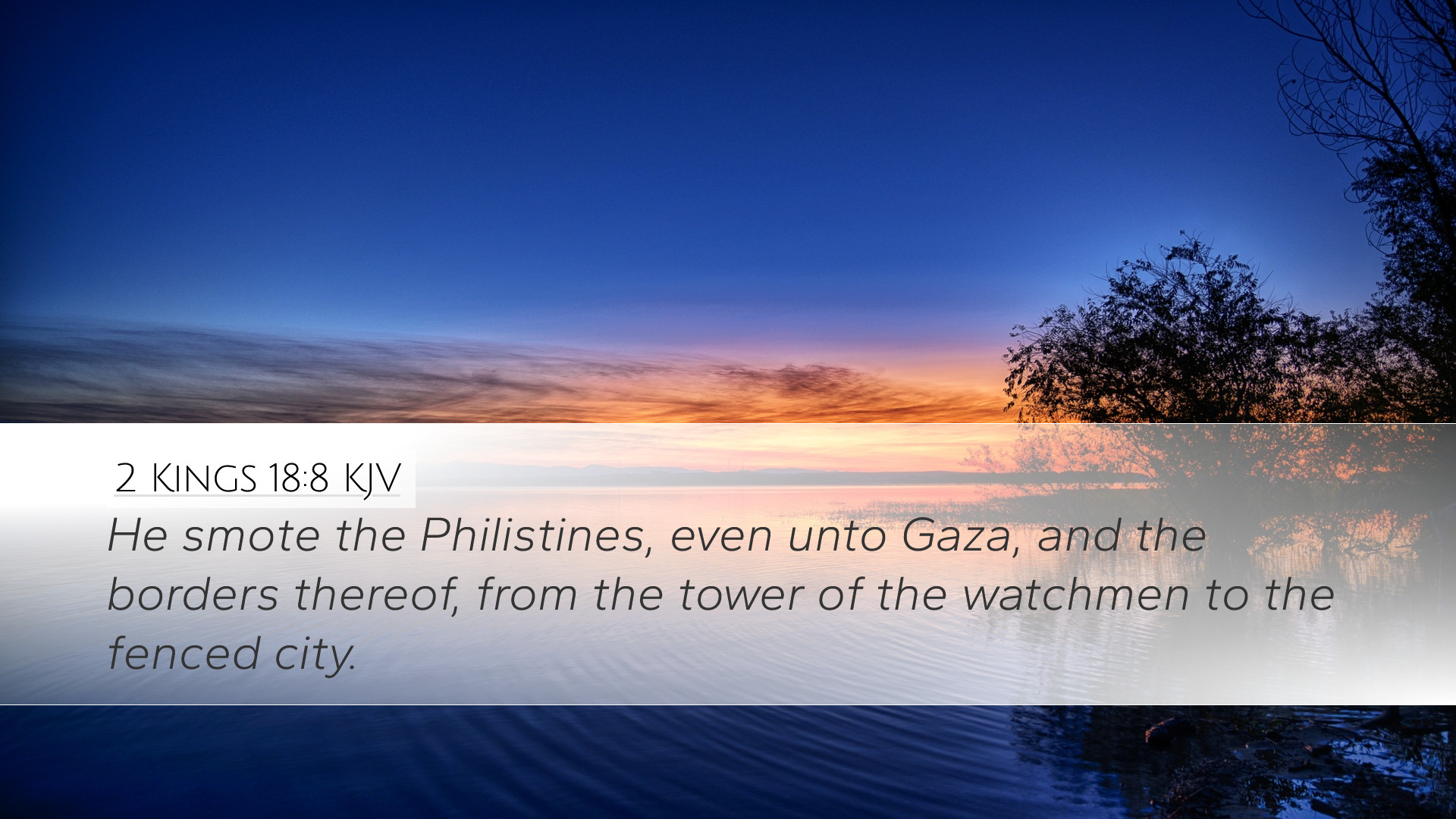Commentary on 2 Kings 18:8
2 Kings 18:8 states: "He smote the Philistines, even unto Gaza, and the borders thereof, from the tower of the watchmen to the fenced city." This verse is a significant historical and theological marker in the narrative of Judah under King Hezekiah, encapsulating a period of both military success and covenant faithfulness.
Historical Context
Hezekiah, one of the last righteous kings of Judah, comes to the throne during a period marked by the Assyrian threat and internal decay within Israel. Commentators like Matthew Henry elucidate that Hezekiah's reign is marked by significant reforms and a return to Yahweh, contrasting sharply with the idolatry of previous rulers, particularly Ahaz, his father.
Military Campaigns Against the Philistines
In this passage, Hezekiah’s military prowess is highlighted through his engagement against the Philistines. Albert Barnes notes that this conflict symbolizes not just a military achievement but also a spiritual triumph over the remnants of Israel's ancient enemies, emphasizing the fulfillment of God’s promise to protect His people.
-
Significance of Gaza: Gaza is mentioned as a key city, a stronghold of the Philistines. Historically, the control over Gaza was vital, as it served as a gateway to trade routes and military movements. Adam Clarke elaborates on how the conquest of Gaza can be seen as a restoration of Israel's territorial integrity and prestige.
-
From the Tower to the Fenced City: The phrase “from the tower of the watchmen to the fenced city” could suggest a military strategy that employed vigilant observation and fortified strength. This notion is explored in depth by several commentators, suggesting that Hezekiah’s triumph was also a testament to well-planned military strategy and divine favor.
Theological Implications
The verse serves not only as a historical account but carries significant theological implications. Henry interprets this success as evidencing God's providential hand upon Hezekiah, who sought to unearth the legacy of faithfulness to the covenant. It illustrates a pivotal moment of returning to God and the resultant blessings that follow such obedience.
The Covenant Relationship
The narrative surrounding verse 8 serves as a reminder of the covenantal themes foundational to the narrative of scripture. Barnes points out that victories such as these are often predicated upon the nation's adherence to God’s statutes. The correlation between Israel's faithfulness and their military successes represents a broader biblical principle of divine-human partnership where blessings flow from obedience.
Lessons for Contemporary Believers
For modern pastors, students, and theologians, this passage offers deep insights into the necessity of spiritual vigilance and faithfulness in the face of cultural and spiritual adversities.
-
Vigilance in Spiritual Warfare: Just as Hezekiah maintained watch over his cities, believers are called to vigilance in their spiritual lives, staying alert to the influences that undermine faith and devotion.
-
God's Deliverance: The narrative illustrates that God delivers His people when they earnestly seek Him, pointing to the importance of prayer and dependence on divine strength in times of trouble.
Conclusion
2 Kings 18:8 encapsulates not only a historical event but also serves as a rich source of theological reflection and application for believer's lives today. The insights gleaned from the combined commentaries of Matthew Henry, Albert Barnes, and Adam Clarke underline the importance of covenant faithfulness, God's sovereignty over nations, and the encouragement of steadfast faith amid challenging circumstances. This verse remains an enduring testament to the power of God in the midst of His people as they strive for righteousness and seek after Him wholeheartedly.


